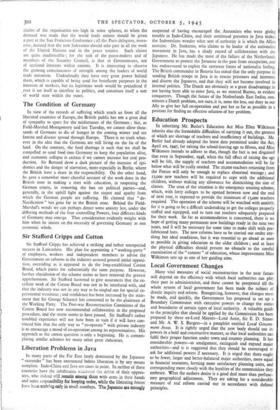The Condition of Germany
In view of the records of suffering which reach us from all the liberated countries of Europe, the British public has not a great deal of sympathy to spare for the misfortunes of the Germans ; bin, as Field-Marshal Montgomery said last Tuesday, we cannot allow thou- sands of Germans to die of hunger in the coming winter and see famine and disease spread through Europe. There is no truth what- ever in the idea that the Germans are still living on the fat of the land. On the contrary, the food shortage is such that we shall be compelled to send food into Germany to keep the population alive, and economic collapse is certain if we cannot increase her coal pro-. duction. Sir Bernard drew a dark picture of the increase of epi- demics and the danger of starvation, more especially in Berlin, where the British have a share in the responsibility. On the other hand, he gave a somewhat more cheerful account of the work done in the British zone in making a start with education, in reopening the German courts, in removing the ban on political parties—and, generally, in the uphill fight against the stupor and apathy from which the German people are suffering. He claimed that " de- Nazification " has gone far in the British zone. Behind the Field- Marshal's words we can perhaps detect some anxiety lest, under the differing methods of the four controlling Powers, four different kinds of Germany may emerge. That consideration evidently weighs with him when he insists on the necessity of governing Germany as one economic whole.


























 Previous page
Previous page